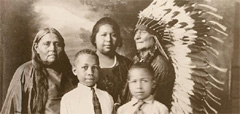The idea of replacing Columbus Day with a day celebrating the indigenous people of North America first arose in 1977 from the International Conference on Discrimination Against Indigenous Populations in the Americas, sponsored by the United Nations in Geneva, Switzerland. At the First Continental Conference on 500 Years of Indian Resistance in Quito, Ecuador, in July 1990, representatives of Indian groups throughout the Americas agreed that they would mark 1992, the 500th anniversary of the first of the voyages of Christopher Columbus, as a year to promote "continental unity" and "liberation."
In 1992, the group convinced the city council of Berkeley, California, to declare October 12 a "Day of Solidarity with Indigenous People", and 1992 the "Year of Indigenous People", and to implement related programs in schools, libraries, and museums. The city symbolically renamed Columbus Day "Indigenous Peoples’ Day" beginning in 1992 to protest the historical conquest of North America by Europeans, and to call attention to the demise of Native American people and culture through disease, warfare, massacre, and forced assimilation. Performances were scheduled that day for Get Lost (Again) Columbus, an opera by a Native-American composer. Berkeley has celebrated Indigenous Peoples’ Day ever since. Beginning in 1993, Berkeley has held an annual pow wow and festival on the day.
Source: wikipedia.org | ca.gov
In 2019 Indigenous People’s Day in Berkeley, California in USA falls on October 14.









